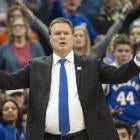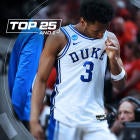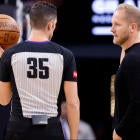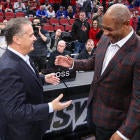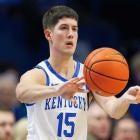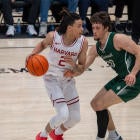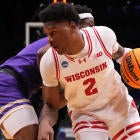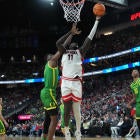The Kansas men's basketball program is defined by consistency. That's a somewhat unremarkable recognition on its face, but it's exceptional in context.
Like how the program has won 14 consecutive Big 12 regular-season championships dating back to 2005. Or how it boasts an NCAA-leading 29 consecutive NCAA Tournament appearances, ahead of North Carolina and Roy Williams, the coach who helped start the streak at KU in 1990.
When you've got a Hall of Fame coach running the show, that's the level of consistency you can expect. And at Kansas, Hall of Fame-caliber coaching is the norm. Get this: You have to go back to 1982 -- 36 years ago! -- to find the last time a Hall of Fame coach wasn't at the helm of the KU program. In 1983, Larry Brown, who was inducted into the Hall of Fame in 2006, took over. He coached at KU until 1988. He was then succeeded by Williams, who himself was inducted in 2006 into the Hall of Fame. Williams ran the program until 2003 prior to Self taking over, and the KU basketball machine has been chugging right along since.
Maintaining that level of success has been easy in large part because of who has ran the ship at Kansas. Self has been at it for years, and his coaching acumen has aged like a fine wine. But someday, whether its 2020 or 2040, he'll no longer be leading program.
So the question becomes: Who will KU look to tab as Self's successor?
It would be foolish to think anyone could fill Self's shoes. He has the best winning percentage in KU history, a national championship, three Final Four appearances and the adoration of one of basketball's biggest fanbases all under his belt. At some point, he'll step away from the game and KU will be in a spot to try and replace a legend. When that time comes, it will likely spur a wide-reaching search to fill one of the sports most prominent positions.
CBS Sports is running a six-part series on the half-dozen men's college basketball teams that have active Hall of Fame coaches leading their respective programs. We're examining each coach and school's situation, how and when they might leave their posts, and reasonable candidates who could succeed them. This is more than a guessing game on who's next; the series is taking a big-picture look at the unique challenge facing each of the six schools. Our final piece is an exploration of what awaits at Kansas.
Timeline for Bill Self leaving Kansas
Compared to the other five Hall of Fame coaches we've examined -- Syracuse's Jim Boeheim, Kentucky's John Calipari, Michigan State's Tom Izzo, Duke's Mike Krzyzewski and North Carolina's Roy Williams -- Self's case is perhaps the most impossible to predict. He's 55 years old, making him the youngest active Hall of Famer roaming the sidelines. So it's not totally unrealistic to think he could coach for another 15 years -- or longer. He's shown no signs of slowing down, and his success hasn't slipped a bit.
Moreover, Self, like Calipari and Krzyzewski, has nearly priced himself out of the market elsewhere. In the most recent survey of coaching salaries compiled by USA Today, Self was near the top of highest-paid coaches with a total compensation package of nearly $5 million. So leaving for another coaching job on his own volition in college seems extremely unlikely.
Self could maximize his earning power by jumping to the NBA, but that $5 million take-home paycheck is more than many NBA coaches make, and they have significantly less job assurance. That'd suggest that only an upper-tier job would be enough to potentially sway him to make the move. And even then, would he be interested? Unlike many coaches of his stature, he's rarely mentioned when an NBA job opens up.
Self has it pretty good at Kansas. He's compensated well for his success, and hasn't had difficulty sustaining it. It wouldn't surprise anyone to see Self occupying Allen Fieldhouse's sidelines until he's old and gray, at which point he can retire on a farm on the outskirts of Lawrence, Kansas if he wishes. But circumstances can always change, as can minds.
One final scenario to consider about Self's future with the program is the FBI's recent interest in the program in connection with the college basketball corruption scandal. It was reported that the program "loosely acknowledged" it had been subpoenaed in the case, and at the center of the interest related to KU is sophomore forward Silvio De Sousa.
Self hasn't taken heat over the FBI's interest -- and it's important to note that only one head coach, Louisville's Rick Pitino, has lost their job due to the FBI's investigation -- but the probe remains ongoing. No one is suggesting there is any evidence that shows Self is involved in any way with the scandal, to be clear. But if it is eventually proven that KU is guilty of wrongdoing, Self, as the coach and leader of the program, would have fingers pointed in his direction.
Age | 55 |
Seasons | Entering 16th season at Kansas, 26th overall |
Career record | 447-96 at Kansas, 654-201 overall |
NCAA Tournaments | 20 |
Final Fours | 3 |
NCAA titles | 1 |
Hall of Fame induction | 2017 |
Top candidates to replace Bill Self
Self's particular case is so difficult to predict as the most extreme scenarios could have him gone in 2 months or staying 20 more years. I'd bet the latter, if forced to choose. Which means determining candidates to replace him are equally challenging. If he stays 20 more years, for example, most of the candidates on the list would be too old to likely be serious candidates. 20 years from now, there could -- and likely will be -- a new crop of up-and-comers deserving of a shot at the Kansas job, some of which may not be on the radar yet.
But if the reality of Self's future at KU is closer to the lesser extreme, like say, eight more years, the current crop of up-and-comers and established coaches aren't likely to change drastically from now to that point.
So with that in mind, here are some names that could make sense when that time comes.
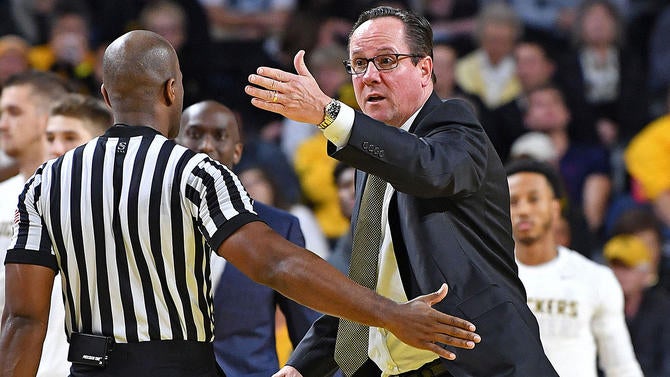
1. Gregg Marshall
Currently: Coach at Wichita State
Résumé: Marshall began his head coaching career in 1998 at Winthrop, where he coached until 2007. He amassed a 194-83 record during that span, including seven NCAA Tournament appearances and six first-place finishes in the Big South. He left for Wichita State in 2007, and picked up where Mark Turgeon left off by transforming the Shockers into a premier mid-major squad. They have won 25+ games in each of the last nine seasons. He's led them to six consecutive NCAA Tournament appearances, and has thrice been named MVC Coach of the Year.
Why it could be him: No coach knows Kansas and its surrounding area -- outside Self -- as well as Gregg Marshall. He's been recruiting the region and navigating it successfully for over a decade now. Of the coaches on this list, he'd arguably be the most sought after if he chose to leave Wichita State, and KU would surely find him appealing. The success he's had everywhere, including Wichita State where he's racked up a 286-98 record, made a Final Four, and consistently advanced in the Big Dance are all reasons he'd likely be considered.
Why it wouldn't be him: Marshall has had the opportunity to make a leap elsewhere in the past but he's elected to stay put at Wichita State. For one: He's paid handsomely. And two: he's a legend in Wichita. He is to the city of Wichita, Kansas -- and the area surrounding it -- what Bill Self is to Lawrence and its surrounding cities. Only obstacle is, why would Marshall leave his legendary status behind to try and replace another celestial figure cross-state? Taking a Kansas job to replace Self would be a daunting task -- especially if he's coming from a program that is a direct rival of Kansas.
2. Fred Hoiberg
Currently: Coach of the Chicago Bulls
Résumé: Fred Hoiberg played at Iowa State from 1991 to 1995 before enjoying a 10-year playing career in the NBA with the Pacers, Bulls and Timberwolves. He retired in 2006. Years later, in 2010, he began a successful five-year stint at Iowa State, where he coached the Cyclones to a 115-56 record before taking over the Chicago Bulls. He's 110-136 with the Bulls.
Why it could be him: Hoiberg was considered an offensive genius when he was at Iowa State, where he led his alma mater to two Big 12 Tournament titles, four NCAA Tournament appearances, and one appearance in the Sweet 16. Frankly, given his less-than-impressive track record with the Bulls, he could be looking for a job soon. And a jump back down to the college level where he proved plenty successful could make some sense. He'd be a hot coaching commodity in college basketball circles.
Why it wouldn't be him: Hoiberg's Bulls career has been a trainwreck, so it's safe to say KU would be buying low on his stock. But it's fair to note that the Bulls he took over in 2015 -- a team that featured Jimmy Butler, Derrick Rose, Pau Gasol and Taj Gibson -- is years removed from what it is now. The franchise has turned over the roster entirely, and Hoiberg has facilitated a rebuild that has led to missing the playoffs two of the three seasons he's been at the helm. Would KU take a risk on a coach that last had a winning season in 2015-16?
3. Danny Manning
Currently: Coach at Wake Forest
Résumé: Manning may be known best for his role on "Danny and the Miracles" -- the 1988 Kansas team that won the NCAA Tournament despite losing 11 games in the regular season. But he's made a name for himself in a post-playing world, too. He started at KU as a team manager in 2003 and worked his way into an assistant job in Lawrence from 2006 to 2012. From there he coached at Tulsa for two seasons before taking the Wake Forest job he currently occupies. He's 54-73 as a coach.
Why it could be him: Manning turned Tulsa into an NCAA Tournament team in the second of his two seasons, leading the Golden Hurricanes to a regular season conference crown in 2013-14 before taking the Wake Forest job. So he's proven he's got some coaching chops. And, perhaps more importantly, he's one of the most well-liked Jayhawk players of all time. That he's got experience as both a player and coach at KU bodes well for any potential consideration down the line.
Why it wouldn't be him: Manning's coaching stock isn't exactly soaring. He's just 54-73 at Wake Forest and it's likely he would need to prove he can build and sustain a successful program before KU would consider himself seriously, and after an 11-20 campaign in 2017-18, it's unlikely he'd be KU's first option if Self retired anytime soon.
4. Jerod Haase
Currently: Coach at Stanford
Résumé: Haase ended his playing career at Kansas and began his coaching career there. He also served as an assistant at North Carolina before taking the UAB coaching job in 2012, leading the Blazers to an upset of No. 2 seed Iowa State in the Round of 64 of the 2015 NCAA Tournament before leaving for Stanford in 2016.
Why it could be him: Haase, like Manning, has strong ties to Kansas both as a player and coach. He began his playing career at Cal before finishing in Lawrence, and spent 1999 to 2003 in Kansas before following Roy Williams to North Carolina. Not only did he cut his coaching teeth directly under a Hall of Famer in Williams, he's been able to find success independently. He has a 113-86 overall record as a coach.
Why it wouldn't be him: Haase would need to show at Stanford that he can become a consistent NCAA Tournament team in the Pac-12. In his brief coaching tenure that began in 2012 as a head man, he's only made the Big Dance once, and has yet to do so with the Cardinal.
5. Mike White
Currently: Coach at Florida
Résumé: White began his coaching career as a Jacksonville State assistant in 2000, then took the leap to Ole Miss where he was an assistant from 2004 to 2011. He coached successfully at Louisiana Tech from 2011 to 2015 where he achieved a 101-40 record and won the regular season conference crown in three of his four seasons. He's been coach at Florida since 2015 and made the NCAA Tournament two of the last three seasons.
Why it could be him: White has no direct ties to Kansas -- he never played there, never coached there -- but he'd be considered because he's widely viewed as a rising star in the coaching profession. In fact, he was viewed that way before he took the Florida job -- which, arguably, is a top-15 gig. In his seven seasons as a coach, he's never had a losing record. And he's only won fewer than 21 games once: his first at Louisiana Tech. Plus, Kansas could likely offer him a significant salary increase from his current pay if it wanted.
Why it wouldn't be him: Florida has treated White well, and in return, White has been good for the Gators. He's been to two consecutive NCAA Tournaments, won 69 games in three seasons, and coaches in a prominent basketball league in the SEC. Making a jump from UF to KU would undeniably be an upgrade, and it'd be hard to argue against why he wouldn't take a top-5 job like Kansas, but would the timing be right? If he gets things rolling with the Gators, reels off a few SEC championships and makes a few deep NCAA Tournament runs like Billy Donovan was able to do at Florida, it's possible he'd feel more comfortable staying put.
The takeaway
Where Kansas will turn when Self retires is largely dependent upon when it happens. If he retired next week, you'd have to think Kansas would consider all the aforementioned options. Or perhaps they'd skim the top of the coaching ranks now and consider snagging a coach like Tony Bennett or Sean Miller. Or maybe they'd look within and give Kurtis Townsend, Norm Roberts or Jerrance Howard a shot.
But what if KU wanted to keep it semi-in-house, but not among the current coaching crop? Mark Turgeon or Tad Boyle, two former KU assistants who are head coaches at Maryland and Colorado currently, for instance. All of those could be names to keep in mind given their ties to the program.
It's impossible to predict a replacement scenario, but it's not implausible to think Kansas could potentially get almost anyone it wants.
And because of both its prominence and track record as one of the most successful programs in the sport historically, KU likely won't have a narrow scope of candidates from which it can pick from.













